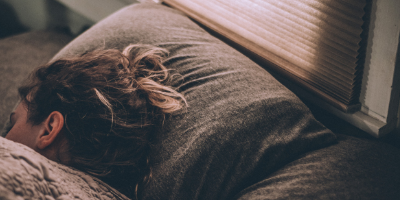7 tips for sleeping with rheumatoid arthritis
Published 3 Oct 2018

People with rheumatoid arthritis may find that pain or discomfort prevents them from falling asleep. Not sleeping well can have an impact on the severity of a person's symptoms, as well as their general well-being. But there are some things that people can try that may help with sleep.

Pain, discomfort, and the side effects of medication can make it harder for a person with RA to fall asleep or stay asleep throughout the night.
According to the Centers for Disease Control and Prevention (CDC), adults over 18 should get a minimum of 7 hours of sleep per night. Getting less than this on a regular basis can have an impact on a person's health. Lack of sleep can make RA symptoms worse, and could lead to a flare-up of the disease. Fatigue can make the pain more difficult to manage.
RA and insomnia
RA can cause pain, which may cause stress or worry and prevent a person from getting to sleep. Some people may find that their symptoms cause them to wake during the night.
Some medications, such as prednisone and hydroxychloroquine, also have the side effect of causing sleeplessness. It is a good idea to take these drugs earlier in the day to reduce this effect.
Tips for dealing with insomnia
1. Exercising
Exercise can help a person sleep.
Gentle exercise is a meaningful way to reduce or improve RA symptoms. Exercise can also help a person to sleep and can improve mood and well-being.
The CDC recommend that a person does 2.5 hours of moderate exercise every week. However, people with RA should start slowly and build up the amount of activity they do according to their ability. It is better to do a small amount of exercise than nothing at all.
Walking, swimming, cycling, and stretching are all examples of exercise that will not put too much strain on the joints or the body.
Exercise can also help to keep joints flexible, which should improve the range of motion a person has in their joints. People should avoid activities that put too much pressure on the joints, for example twisting or jumping.
RA can also cause disability in the long-term and exercise can help to prevent or delay this.
2. Cutting out caffeine
Caffeine can stop people from falling asleep.
People with RA should avoid drinking caffeine late in the afternoon or evening if it is affecting their sleep.
It is possible to replace coffee or tea with decaffeinated versions or herbal teas. Watch out for hidden sources of caffeine, such as soda, energy drinks, and green tea.
3. Avoiding alcohol
Drinking alcohol in the evening can stop a person from falling asleep easily. It may also mean a person wakes during the night or does not sleep as deeply.
Drinking alcohol alongside some RA medications could also pose a health risk.
4. Trying not to nap
Some RA medication can cause drowsiness, and napping or falling asleep during the day can make it more difficult to sleep at night.
People should try to avoid taking a nap during the day for this reason. Getting some fresh air or doing stretching exercises can help a person feel less drowsy and avoid napping.
5. Relaxing
Living with RA can be stressful, and taking time to relax, particularly before trying to fall asleep, can help.
Try creating a bedtime routine that is the same every night. People may choose to read a book, light a candle, or play some quiet music.
Sometimes, when a person is trying to get to sleep, worries or concerns often intrude into their minds. Keeping a notepad or dictaphone by the bed to record these concerns can help keep them out of mind.
6. Practicing good sleep hygiene
Using good sleep hygiene practices can help a person get to sleep faster.
Sleep hygiene means adopting good habits for better sleep, including:
going to bed and getting up at the same time every day
making the bedroom a quiet, relaxing space
keeping the temperature cool in the bedroom
using a blackout blind to make sure the bedroom is dark enough to sleep
switching off electronic devices 30 minutes before getting into bed
Good sleep hygiene can help the body recognize when it is time for sleep. If a person is relaxed and has no distractions, they should be able to get to sleep faster.
7. Meditating
Research on mindfulness meditation suggests that it can help to treat insomnia.
Taking time to do a meditation exercise, such as focusing on breathing, can help to calm the mind and relax the body.
Meditating can make it easier to fall asleep, or help a person go back to sleep if they wake in the night.
8. Not overeating before bed
Going to sleep with a stomach that is too full can stop a person getting to sleep.
Try to eat at least a couple of hours before going to bed. Any snacks before trying to fall asleep should be light.
Do you have any tips to share about how you get to sleep?
Medical News Today
17 comments

You will also like

Fifteen percent of osteoporosis patients who take 'drug holidays' suffer bone fractures
7 May 2018 • 8 comments

Rheumatoid arthritis: "I never tried to accept the disease but to move forward"
20 Mar 2021 • 5 comments

 Facebook
Facebook Twitter
Twitter




